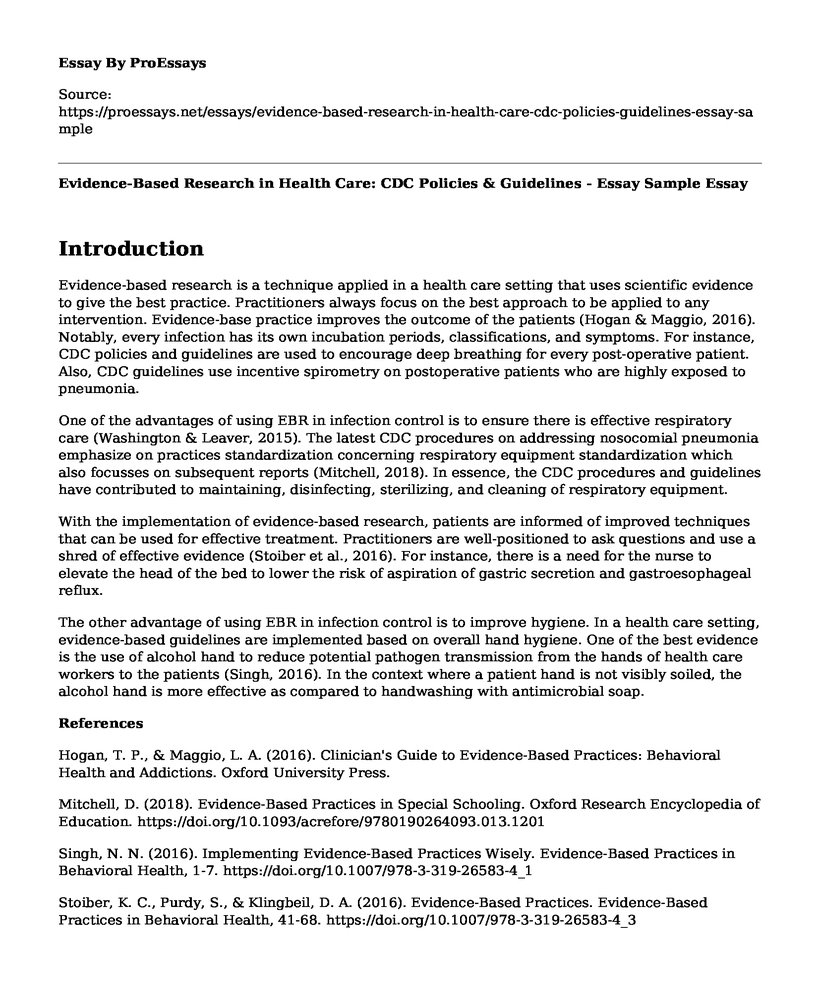Introduction
Evidence-based research is a technique applied in a health care setting that uses scientific evidence to give the best practice. Practitioners always focus on the best approach to be applied to any intervention. Evidence-base practice improves the outcome of the patients (Hogan & Maggio, 2016). Notably, every infection has its own incubation periods, classifications, and symptoms. For instance, CDC policies and guidelines are used to encourage deep breathing for every post-operative patient. Also, CDC guidelines use incentive spirometry on postoperative patients who are highly exposed to pneumonia.
One of the advantages of using EBR in infection control is to ensure there is effective respiratory care (Washington & Leaver, 2015). The latest CDC procedures on addressing nosocomial pneumonia emphasize on practices standardization concerning respiratory equipment standardization which also focusses on subsequent reports (Mitchell, 2018). In essence, the CDC procedures and guidelines have contributed to maintaining, disinfecting, sterilizing, and cleaning of respiratory equipment.
With the implementation of evidence-based research, patients are informed of improved techniques that can be used for effective treatment. Practitioners are well-positioned to ask questions and use a shred of effective evidence (Stoiber et al., 2016). For instance, there is a need for the nurse to elevate the head of the bed to lower the risk of aspiration of gastric secretion and gastroesophageal reflux.
The other advantage of using EBR in infection control is to improve hygiene. In a health care setting, evidence-based guidelines are implemented based on overall hand hygiene. One of the best evidence is the use of alcohol hand to reduce potential pathogen transmission from the hands of health care workers to the patients (Singh, 2016). In the context where a patient hand is not visibly soiled, the alcohol hand is more effective as compared to handwashing with antimicrobial soap.
References
Hogan, T. P., & Maggio, L. A. (2016). Clinician's Guide to Evidence-Based Practices: Behavioral Health and Addictions. Oxford University Press.
Mitchell, D. (2018). Evidence-Based Practices in Special Schooling. Oxford Research Encyclopedia of Education. https://doi.org/10.1093/acrefore/9780190264093.013.1201
Singh, N. N. (2016). Implementing Evidence-Based Practices Wisely. Evidence-Based Practices in Behavioral Health, 1-7. https://doi.org/10.1007/978-3-319-26583-4_1
Stoiber, K. C., Purdy, S., & Klingbeil, D. A. (2016). Evidence-Based Practices. Evidence-Based Practices in Behavioral Health, 41-68. https://doi.org/10.1007/978-3-319-26583-4_3
Washington, C. M., & Leaver, D. T. (2015). Principles and Practice of Radiation Therapy. Elsevier Health Sciences.
Cite this page
Evidence-Based Research in Health Care: CDC Policies & Guidelines - Essay Sample. (2023, Apr 06). Retrieved from https://proessays.net/essays/evidence-based-research-in-health-care-cdc-policies-guidelines-essay-sample
If you are the original author of this essay and no longer wish to have it published on the ProEssays website, please click below to request its removal:
- Nursing and Conflict Management Questions and Answers Paper Example
- Technology, Medicine and Cancer Annotated Bibliography
- Essay Sample on Electronic Medical Records
- Essay Sample on Pharma Industry: Stereotypes & Stakeholder Perceptions
- Essay Example on Is E-Cigarette Smoking as Harmful as Tobacco?
- Essay Sample on Health Considerations in Canada's Foreign Policy: Impact of Globalization
- Essay Example on Mary Eliza: A Trailblazing Black Professional Nurse







